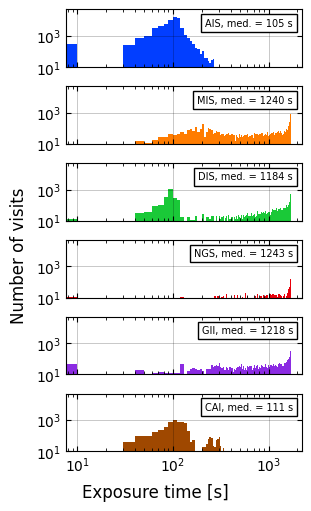GALEX Visits¶
In this tutorial we are going to inspect the GALEX visits table. This is the full
list of observations by GALEX available on MAST. During initialization of a GALEXField
with given field ID this list is searched for all visits belonging to this field.
import numpy as np
import matplotlib.pyplot as plt
from matplotlib.offsetbox import AnchoredText
import pandas as pd
from astropy.table import Table
from vasca.resource_manager import ResourceManager
import vasca.utils as vutils
# Initialize ResourceManager
rm = ResourceManager()
gal_visits = rm.get_path("gal_visits_list", "vasca")
# tt_gal_visits is a table containing info about all GALEX visits
tt_gal_visits = Table.read(gal_visits)
tt_gal_visits.info()
<Table length=100865>
name dtype
---------------- -------
RATileCenter float64
DECTileCenter float64
survey bytes3
nexptime float64
fexptime float64
imgRunID int64
ParentImgRunID int64
joinID int64
tileNum int64
specTileNum int64
source bytes6
nPhotoObjects int64
nPhotoVisits int64
PhotoObsDate bytes22
spectra bytes5
nSpectra bytes4
nSpectraVisits bytes4
SpecObsDate bytes4
visitNum int64
subvis int64
minPhotoObsDate bytes22
maxPhotoObsDate bytes22
minSpecObsDate bytes4
maxSpecObsDate bytes4
PhotoObsDate_MJD float64
# Convert astropy Table to pandas DataFrame for better query/aggregation methods
# String columns are bytes in the Table representation and need to decoded in the DataFrame
df_gal_visits = tt_gal_visits.to_pandas().apply(
lambda x: x.str.decode("utf-8") if x.dtype == "O" else x
)
| RATileCenter | DECTileCenter | nexptime | fexptime | imgRunID | ParentImgRunID | joinID | tileNum | specTileNum | nPhotoObjects | nPhotoVisits | visitNum | subvis | PhotoObsDate_MJD | |
|---|---|---|---|---|---|---|---|---|---|---|---|---|---|---|
|
Loading ITables v2.2.3 from the init_notebook_mode cell...
(need help?) |
Surveys¶
Find more about GALEX surveys on the documentation page AIS : All-Sky Imaging Survey. Exposure time of 100s over 26,000 square degrees of sky reaching a depth of mAB = 20-2 in both bands.
- MIS
Medium Sky Imaging Survey. Single orbit exposures (1,500s) of 1000 square degrees in positions that match the Sloan Digital Sky Survey (SDSS) spectroscopic footprint.
- DIS
Deep Sky Imaging Survey. Exposure goal of 30,000s over 80 square degrees of sky.
- NGS
Nearby Galaxy Survey. Nearby galaxies with a nominal exposure time of 1000s to 1500s.
- GII
Guest Investigator Imaging. 33% of observing time per year to peer reviewed proposals from the community.
- CAI
Calibration Imaging. White dwarf standards for the purposes of calibration.
Survey Stats¶
Below are several statistics on the GALEX data set.
Tip
One of the many useful utility functions for visualization is color_palette.
It returns a list of colors for given color map
and specified number of elements
survey_names = ["AIS", "MIS", "DIS", "NGS", "GII", "CAI"]
n_surveys = len(survey_names)
survey_colors = vutils.color_palette("bright", n_surveys, show_in_notebook=True)
# Aggregate
df_survey_grpd = df_gal_visits.groupby("survey")
survey_stats = {}
for survey in survey_names:
df_survey_visits = df_survey_grpd.get_group(survey)
stats = {}
stats["n_vis"] = len(df_survey_visits)
stats["n_fd"] = len(df_survey_visits.ParentImgRunID.unique())
stats["texp"] = df_survey_visits.nexptime.sum()
survey_stats[survey] = stats
df_survey_stats = pd.DataFrame().from_dict(survey_stats).T
# df_survey_stats
| n_vis | n_fd | texp | |
|---|---|---|---|
|
Loading ITables v2.2.3 from the init_notebook_mode cell...
(need help?) |
Number of visits
Show code cell source
plot_name = "n_vis"
fig, ax = plt.subplots(num=plot_name, figsize=(3, 3), layout="constrained")
total = df_survey_stats.n_vis.sum()
text = AnchoredText(f"Total: {total:1.0f}", loc="upper right")
ax.add_artist(text)
bars = ax.bar(
survey_names,
df_survey_stats.n_vis,
color=survey_colors,
)
ax.bar_label(bars, labels=[f"{x:1.0%}" for x in df_survey_stats.n_vis / total])
ax.margins(y=0.2)
ax.set_ylabel("Number of visits")
ax.set_xlabel("Survey")
ax.set_yscale("log")
ax.grid(visible=True, linewidth=0.5, color="k", alpha=0.3, zorder=0)
ax.tick_params(axis="y", direction="in", left=True, right=True, which="both")
ax.tick_params(axis="x", direction="in", top=True, bottom=True, which="both")
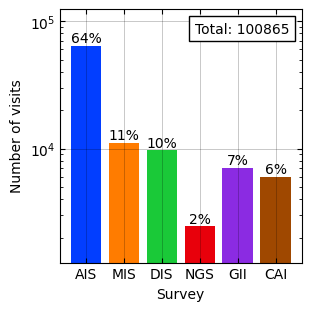
Number of fields
Show code cell source
plot_name = "n_fields"
fig, ax = plt.subplots(num=plot_name, figsize=(3, 3), layout="constrained")
total = df_survey_stats.n_fd.sum()
text = AnchoredText(f"Total: {total:1.0f}", loc="upper right")
ax.add_artist(text)
bars = ax.bar(
survey_names,
df_survey_stats.n_fd,
color=survey_colors,
)
ax.bar_label(bars, labels=[f"{x:1.1%}" for x in df_survey_stats.n_fd / total])
ax.margins(y=0.2)
ax.margins(x=0.1)
ax.set_ylabel("Number of fields")
ax.set_xlabel("Survey")
ax.set_yscale("log")
ax.grid(visible=True, linewidth=0.5, color="k", alpha=0.3, zorder=0)
ax.tick_params(axis="y", direction="in", left=True, right=True, which="both")
ax.tick_params(axis="x", direction="in", top=True, bottom=True, which="both")
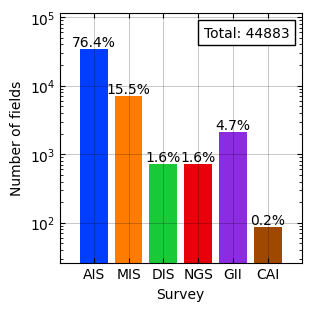
Total exposure time
Show code cell source
plot_name = "texp"
fig, ax = plt.subplots(num=plot_name, figsize=(3, 3), layout="constrained")
total = df_survey_stats.texp.sum()
text = AnchoredText(f"Total: {total:1.0f}", loc="upper right")
ax.add_artist(text)
bars = ax.bar(
survey_names,
df_survey_stats.texp,
color=survey_colors,
)
ax.bar_label(bars, labels=[f"{x:1.0%}" for x in df_survey_stats.texp / total])
ax.margins(y=0.2)
ax.set_ylabel("Total exposure time [s]")
ax.set_xlabel("Survey")
ax.set_yscale("log")
ax.grid(visible=True, linewidth=0.5, color="k", alpha=0.3, zorder=0)
ax.tick_params(axis="y", direction="in", left=True, right=True, which="both")
ax.tick_params(axis="x", direction="in", top=True, bottom=True, which="both")
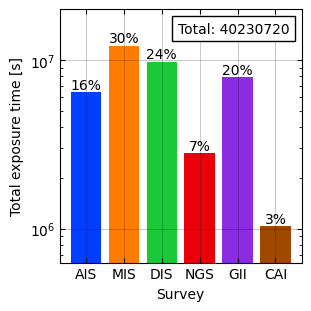
Number of visits per field distribution
Tip
Another useful utility for visualization is the get_hist_bins function which
returns the bin edges for given bin size and a list of non-uniform 1-D data sets.
Show code cell source
survey_nvis = {}
for survey in survey_names:
df_survey_visits = df_gal_visits.query("survey==@survey")
df_fd_grpd = df_survey_visits.groupby("ParentImgRunID")
survey_nvis[survey] = [len(df_grp) for _, df_grp in df_fd_grpd]
bins = vutils.get_hist_bins(list(survey_nvis.values()), bin_size=1)
plot_name = "nvis_dist"
fig, axs = plt.subplot_mosaic(
[[x] for x in survey_names],
num=plot_name,
figsize=(3, 5),
layout="constrained",
sharey=False,
sharex=True,
)
for i, survey in enumerate(survey_names):
ax = axs[survey]
ax.hist(survey_nvis[survey], bins=bins, color=survey_colors[i])
text = AnchoredText(
f"{survey}, med. = {np.asarray(survey_nvis[survey]).mean():1.0f}",
loc="upper right",
prop={"fontsize": 7},
)
ax.add_artist(text)
ax.set_ylim((0.7, 1e5))
ax.set_xscale("log")
ax.set_yscale("log")
ax.grid(visible=True, linewidth=0.5, color="k", alpha=0.3, zorder=0)
ax.tick_params(axis="y", direction="in", left=True, right=True, which="both")
ax.tick_params(axis="x", direction="in", top=True, bottom=True, which="both")
fig.supylabel("Number of fields")
_ = fig.supxlabel("Number of visits")
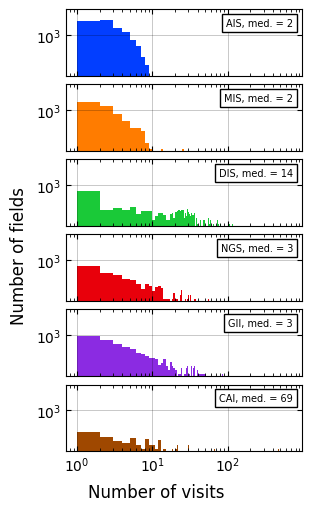
Exposure time distribution
Show code cell source
bins = vutils.get_hist_bins(
[df_gal_visits.query("survey==@x").nexptime.tolist() for x in survey_names],
bin_size=10, # Seconds
)
plot_name = "texp_dist"
fig, axs = plt.subplot_mosaic(
[[x] for x in survey_names],
num=plot_name,
figsize=(3, 5),
layout="constrained",
sharey=True,
sharex=True,
)
for i, survey in enumerate(survey_names):
ax = axs[survey]
data = df_gal_visits.query("survey==@survey").nexptime
ax.hist(data, color=survey_colors[i], bins=bins, label=survey)
text = AnchoredText(
f"{survey}, med. = {np.median(data):1.0f} s",
loc="upper right",
prop={"fontsize": 7},
)
ax.add_artist(text)
ax.set_ylim((10, 5e4))
ax.set_xscale("log")
ax.set_yscale("log")
ax.grid(visible=True, linewidth=0.5, color="k", alpha=0.3, zorder=0)
ax.tick_params(axis="y", direction="in", left=True, right=True, which="both")
ax.tick_params(axis="x", direction="in", top=True, bottom=True, which="both")
fig.supylabel("Number of visits")
_ = fig.supxlabel("Exposure time [s]")
